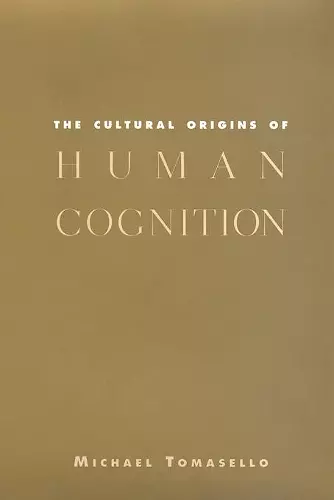The Cultural Origins of Human Cognition
Format:Paperback
Publisher:Harvard University Press
Published:1st Apr '01
Currently unavailable, and unfortunately no date known when it will be back

A much needed book that covers a broad territory with both clarity and authority. Having spent much of his career comparing human and nonhuman primate cognition, Michael Tomasello makes the case for a social developmental foundation of the unique capacities of the human primate--language, complex cognition, and culture. His ontogenetic 'ratchet hypothesis' is both simple and provocative. It will be welcomed--and argued about--by a wide audience. -- Katherine Nelson, Distinguished Professor of Developmental Psychology, City University of New York Tomasello is one of the very few scholars who works at the intersection of the phylogenetic, cultural-historical, and ontogenetic contributions to development. His studies linking non-human primate development to the development of human infants are exciting and compelling. He has done the study of human development a great service with the publication of this book. -- Michael Cole, Professor of Communication and Psychology and Director of the Laboratory of Comparative Human Cognition, University of California at San Diego A powerful and coherent synthesis, and the best formulation of cultural psychology we've yet had. -- Jerome Bruner, New York University
Bridging evolutionary theory and cultural psychology, Tomasello argues that the roots of the human capacity for symbol-based culture are based in a cluster of uniquely human cognitive capacities. These include capacities for understanding that others have intentions of their own, and for imitating what someone else has intended to do.
Ambitious and elegant, this book builds a bridge between evolutionary theory and cultural psychology. Michael Tomasello is one of the very few people to have done systematic research on the cognitive capacities of both nonhuman primates and human children. The Cultural Origins of Human Cognition identifies what the differences are, and suggests where they might have come from.
Tomasello argues that the roots of the human capacity for symbol-based culture, and the kind of psychological development that takes place within it, are based in a cluster of uniquely human cognitive capacities that emerge early in human ontogeny. These include capacities for sharing attention with other persons; for understanding that others have intentions of their own; and for imitating, not just what someone else does, but what someone else has intended to do. In his discussions of language, symbolic representation, and cognitive development, Tomasello describes with authority and ingenuity the "ratchet effect" of these capacities working over evolutionary and historical time to create the kind of cultural artifacts and settings within which each new generation of children develops. He also proposes a novel hypothesis, based on processes of social cognition and cultural evolution, about what makes the cognitive representations of humans different from those of other primates.
Lucid, erudite, and passionate, The Cultural Origins of Human Cognition will be essential reading for developmental psychology, animal behavior, and cultural psychology.
Students of primate behavior are one of several groups who should read this important book. It spells out forcefully what appears to make human development so distinctive, and does so from the perspective of an expert in language acquisition who has also devoted much time to comparative work with apes. It is strong medicine for anybody in danger of romanticizing the similarity of ape to child. Developmental psychologists will find here a well-articulated account of the ontogeny of cultural learning, which challenges alternative accounts from the vantage point of extensive research. -- Andrew Whiten * Nature *
In The Cultural Origins of Human Cognition...[Tomasello] argues that what makes human beings unique is that they are so good at learning from one another and that they create new, original things with what they learn. -- Helen Epstein * Lingua Franca *
A much needed book that covers a broad territory with both clarity and authority. Having spent much of his career comparing human and nonhuman primate cognition, Michael Tomasello makes the case for a social developmental foundation of the unique capacities of the human primate--language, complex cognition, and culture. His ontogenetic 'ratchet hypothesis' is both simple and provocative. It will be welcomed--and argued about--by a wide audience. -- Katherine Nelson, Distinguished Professor of Developmental Psychology, City University of New York
Tomasello is one of the very few scholars who works at the intersection of the phylogenetic, cultural-historical, and ontogenetic contributions to development. His studies linking non-human primate development to the development of human infants are exciting and compelling. He has done the study of human development a great service with the publication of this book. -- Michael Cole, Professor of Communication and Psychology and Director of the Laboratory of Comparative Human Cognition, University of California at San Diego
A powerful and coherent synthesis, and the best formulation of cultural psychology we've yet had. -- Jerome Bruner, New York University
ISBN: 9780674005822
Dimensions: 210mm x 140mm x 17mm
Weight: 349g
256 pages